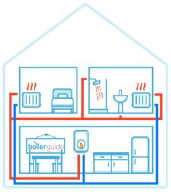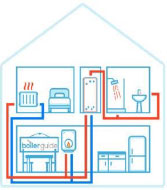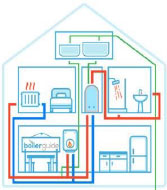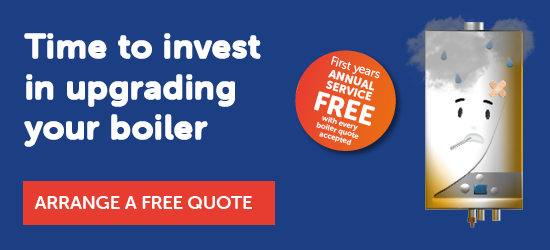FAQs
Not sure what kind of heating system you have, or do you have other questions about getting a boiler installed?
Here’s some useful information to help.
Do I need a new boiler?
There are a few indicators which may prompt you to consider upgrading your boiler, but we’ve found the most common factors are:
1.How old is it? The usual lifecycle for a boiler is between 12 and 15 years – if yours is around that age or older, it’s probably becoming unreliable and expensive to run. It often means that replacement parts become harder to find and due to that, they’re usually expensive too.
2.What condition is it in? If it’s noisy (known as kettling), breaks down frequently or leaks, it’s likely that it’s beyond it’s best and perhaps at the end of it’s life. If there is a strange smell coming from the boiler, the flame changes to yellow instead of blue or a Carbon Monoxide alarm triggers, then there may also be safety issues to consider which should be dealt with urgently.
3.How is it performing? You may be noticing that it’s not heating your home as well as it used to, your energy consumption and bills are always increasing or the pressure drops frequently. These are also indicators that could indicate that your boiler is past it’s best. If your radiators don’t seem to be heating, it’s worth bleeding them first.
How much will a new boiler cost?
There are a number of factors considered when producing a final price for customer. Things like the size of the property, the location of the flue, the water pressure entering the building and the system type are all elements that impact the price. Our heating experts will discuss all these factors with you during the visit. The cost will vary based on the solution you need for your property, and we’ll ensure the right balance is found for you.
What capacity boiler do I need?
As a guide, the capacity – which means the ability to output heat and hot water – can be identified by calculating the number of bedrooms, bathrooms and radiators in a property, which reflects the size of home it needs to heat. Our experts will help to specify this based on your home’s specification now, but also in the future if you are considering extensions or any other type of development. Typically, a 2 bedroom, 1 bathroom property with 10 radiators would need a 9-15kw output boiler, whereas a larger 4 bedroom, 3+ bathroom and 20 radiator home would need a capacity of between 27 and 40kw.
What’s a combi boiler?
A boiler that controls your heating and hot water from one place (the ‘combination’), with no need for a hot water cylinder or cold water storage tank. It uses a heat exchanger to convert cold mains water into hot water and supplies that to the pipes around the home, including to taps as well as radiators. Because of this, it only delivers hot water when it is needed.
– Advantages of combi boilers: Combi boilers are compact and save a lot of space so they’re great for smaller homes, which also makes them easier to install and maintain as there’s less that can go wrong. As they aren’t heating water to be stored in a tank, they’re more energy efficient too, and they use the pressure from the main water which means you should have a good level of power. As with all boilers, they come in a range of capacities that have different water flow and central heating outputs to suit your home.
– Disadvantages of combi boilers: They’re not ideal for homes where there is a high demand for hot water at the same time – although storage combi boilers look to resolve that problem and the cylinder is within the boiler itself. They’re not ideal for homes with low water pressure, and sometimes installing them into properties which have had conventional systems can lead to additional work being required to ensure pipes can handle the extra pressure.

What’s a system boiler?
System boilers heat and store water in hot water cylinder, but unlike Regular or Conventional boilers, they take the cold water from the mains rather a cold water storage tank.
– Advantages of conventional boilers: They sit in between Combi and Regular boilers in terms of the space they take up, i.e. more than a combi, but less than a regular as there’s no cold water storage required. They can deliver a larger volume of hot water, and also store the extra too so they’re better for homes with more bathrooms. They’re also easier to install and maintain than regular boilers, with no need for a cold water tank.
– Disadvantages of combi boilers: System boilers take up more room than Combi boilers and if the hot water stored in the cylinder is used, it can take some time to heat up again so it is possible – although unlikely – that the hot water could run out. Electric immersion heaters can also be added to heat the water as an alternative. Storing hot water also means that it’ll lose some heat over time, no matter how well insulated the tank is.

What’s a regular (or conventional) boiler?
Regular boilers are also known as Conventional, Traditional or Heat Only boilers and are traditionally what was installed in larger homes. If you have a water tank in the loft and a hot water cylinder in an airing cupboard, then this is the system you have. The cold water tank is supplied by the cold water mains supply. The cold water feeds down using gravity, meaning the height of the tank is important to increase pressure. When heat is required, a heat exchanger warms the water and pumps it to a hot water cylinder where it is then stored and fed from when hot water is needed for heating, baths, showers etc.
– Advantages of Regular boilers: Able to meet the demands of high water use homes when demand is at the same time. Installing a modern Regular boiler to replace the current one would minimise disruption when compared to installing a combi or system boiler alternative. Developments over the last few years have meant that they have become more energy efficient than ever before.
– Disadvantages of Regular boilers: As with Standard boilers, the water pressure is dependent on gravity, and there is a chance that water being held in a hot water cylinder can cool over time – so insulating it and adding an electrical immersion can help with that. Hot water may also not be available immediately. They do take up the most space though, so are really only suitable for larger properties. Replacing or installing new Regular boilers can be at the higher end of the expense ladder, and take more time – so it’s important to work through what will be the best solution for you with an expert.

What are condensing boilers?
This isn’t a type of boiler as such as all modern boilers are condensing, and can be identified if it has a flue gas recovery system. That means that the water vapour which was traditionally expelled through the flue (the duct to the outside of your property, which can be either out of the side or the roof of your home) is recycled and also converted into heat to increase the efficiency of modern boilers and therefore use less gas. Replacing an older boiler which could be around 70% efficient with a modern condensing equivalent of over 90% will reduce your energy bills, and offset the investment in your new boiler. One issue that can arise however is that the condensate pipe, used to drain away water, can become frozen during the colder months when installed externally – but the good news is that there’s a quick fix by simply thawing it with hot (but not boiling) water. If you’re in any doubt though, you can call an engineer to assist.
What’s the difference between vented and unvented cylinders?
Vented cylinders are typically found alongside Regular boilers when water is delivered to the cylinder from a cold water tank in the loft.
Unvented cylinders take their cold water feed directly from the cold water mains, which means they are more likely to be found with System boilers.
The capacity of any cylinder should again be considered against the current and future demands of your home.
How much can a new boiler save on my energy bill?
According to the Energy Saving Trust, heating accounts for 55% of your energy bill, so making it more efficient can lead to big savings. They quote that when upgrading from a G-rated boiler to an A-rated condensing boiler with a programmer, thermostat and thermostatic radiator valves (TRV’s) can save you over £200 annually in a typical semi-detached home, or more if you live in a larger or detached property.
Are Smart Heating Controls really worth the investment?
Being able to better control your heating can never be a bad thing. Smart Controls, such as Hive, do exactly the same job of a traditional thermostats, with the additional benefit of being able to control your heating from wherever you are, and even down to a room by room level with smart TRV’s added also. Not only can you manually turn your heating off, on or boost it when you’re out of the property, but through geo-fencing through your smart phone(s), the technology will also turn automatically turn off your heating when you leave, and learn how long it takes to heat your home to a specific temperature and turn it on at the relevant time. Hive quote that savings up to £120 per year can be achieved, so worth considering!
Which boiler brand is best?
It’s a very competitive market, with quality of new models ever improving across all manufacturers. Each have their pros and cons which our Engineer would be happy to discuss with you, but our preferred part is Baxi as they provide a strong range of reliable, affordable and highly efficient boilers with different warranty options and have been manufacturing in the UK since 1866. If you’d prefer a different brand, our Engineer would discuss that with you too as we focus on providing the best solution for each customer individually.
How do I pick the right installer?
It’s absolutely essential that whoever you pick to install your new boiler is Gas Safe Registered, at a minimum as safety and quality must always be the priority. It’s also important that you look beyond the quote and consider a number of other factors including the following points, remembering that a cheap price isn’t usually the best way forward:
1.The quotation process itself – do you feel comfortable with the person visiting you and giving you the price? Never feel pressured into accepting a quote, a hard-sell for this level of investment shouldn’t be the way forward. It’s often a significant investment and you need to trust the company doing the work an that they work hard for you getting the right solution in place that’s going to be with you for quite a long time.
2.The reputation and history – always consider the background information. Whilst sole traders may be cheap, that doesn’t mean they’ve got a great deal of experience or a good reputation. Look at how long the company has been trading and what their reviews are like.
3.The flexibility of the install – this is about being convenient for you, not the installer. Ensure that you’re not forced into taking decisions that don’t work for you.
4.The solution and the price – make sure that you understand why the final quote is the one being recommended, and you’re comfortable with the costs. Installers who only fit one type of boiler may not be able to provide the best solution for you – so a supplier who can access a wider range of makes and models should be better, if they can explain why they’ve landed on recommendation.
5.The post-install service – the last thing you want if you experience any issues after the install is to not be able to get hold of the installer again. Again, look for suppliers who are established and offer additional support on top of the warranty you’ve chosen, and don’t forget you’ll need to get your boiler serviced annually to maintain your warranty.
6.A safe install – Ensure that the installation itself will follow Covid-19 best practice. Social Distancing, PPE and leaving a clean and tidy workspace once the install is completed are all important. Also, ensure they’ve told you what will happen with the boiler they’re replacing so you don’t get left with it yourself.
7.Certification – Finally, ensure that the installer will complete all the post-install documentation for you, including certifying the install and submitting information to set-up your warranty.

